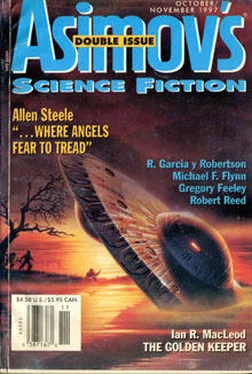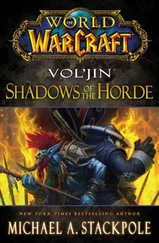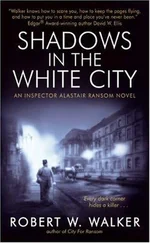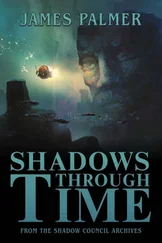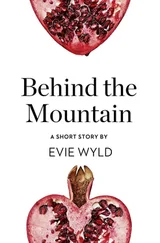Shadows on the Mountain
by James Sarafin

Illustration by Laurie Harden
We can get back in there, kill a couple, then come out in a week, ten days at most,” Davis said. His map was spread between us, at lunch in a restaurant on the ground floor of a downtown Anchorage hotel. It covered the whole table, dangling almost to my lap. Davis’s arms pinned it down; his hands lay across my side of the table. I leaned back with my arms crossed.
It was driving the waiter crazy, that map. He’d brought the bread basket and butter dish, waiting pointedly for us to make enough space to set them down. Davis lifted one arm and shoved the map over with the other, clearing maybe four inches on the table edge. He looked tired, like he’d been out late.
The waiter looked toward the front register; a corner of his mouth twitched. Davis didn’t budge further or even look up. Finally the waiter set down the basket and dish and pushed gingerly into the map. When he let go the map recoiled, shoving the basket to the edge. The waiter and I watched, expecting to see it fall. Davis just continued his spiel.
“No one’s hunted back there for years. Too much of a hike, and the weather off the glacier keeps those mountains too socked in most of the time to fly. Believe me, this is the place to go for a record-book billy.”
I sat there with my arms crossed and barely nodded. Cindy was right—no way he was going to let me out of it, after we’d drawn those Fish and Game permits.
“Strange goats though,” he went on. “Atypical trophies, because of their head shape. I saw one of the few ever taken out of there on an old guide’s wall, and he had a tall tale to go with it. Claimed the goat was charging him when he shot it.”
The waiter stood to take our lunch orders, his mouth trying not to twitch. Davis finally folded up the map. We finished eating and argued briefly over the check, but he paid.
“You look beat, Bruce,” he said, when we went out on the street. “You’re in good shape, right? ’Cause this is going to be one tough mother of a hunt. We’ve got to carry all our gear and food on our backs, plus the meat and capes coming out.”
“I don’t go to a health club, Rick, but I work on my feet all day.” As soon as I spoke I realized that my last remaining bit of pride had just foreclosed a possible way out.
“I’ll see you at my place, Saturday morning at seven.”
I watched him cross the street to go back to his office, and he and the crosswalk began to tilt. It happened as the crosswalk sign started blinking red, “DON’T WALK.” Everything kept tilting to the left, the crosswalk, street, and Davis going vertical on me, the ground turning into a wall for at least the dozenth time in the past week. I held myself against the side of the hotel to keep from flying down the street, maybe all the way into Cook Inlet. Watching Davis grow smaller, shoulders held back and hands swinging free from his sides in that weightlifter’s walk.
What was wrong with me? The doctor I’d seen that morning couldn’t find anything physical, and ended up asking if I was under stress and how I had been sleeping lately. Sleeping?—I’d almost laughed. But he was just a GP, and maybe he’d missed it, some obscure disorder like a brain tumor maybe, that was sending warning signals before it killed me.
I slumped against the building and closed my eyes, and when at last the world swung back as it was supposed to be I was lying there with my legs out on the sidewalk, like a street drunk. Why hadn’t I left my hand sticking out too?—maybe I would have collected a few bucks. Maybe enough to pay my parking ticket.
Kachemak Bay lay flat as a mirror under motionless low clouds all the way across from Homer. Davis cut the outboard at the end of the long cove and let the swells of our wake overtake us, rocking the bow of his Zodiac onto the beach. We raised the outboard, dropped the transom wheels, and dragged the boat up the beach, which was made of flat stones, mostly shale, worn smooth by the tides. The stones clattered and crunched as we dug in, pulling the boat.
In a hundred yards the beach ended at the exposed roots of giant spruce trees. I heard an eagle cry, taking flight, but I missed seeing him before he was gone into the clouds. We were completely alone; no fishing boats worked the water, and we’d passed the last cabin out near the entrance to the cove. The air was still and the only sound came from our boat’s final swells dying on the beach. I watched Davis tie the boat to a huge old spruce, maybe six feet in diameter at the trunk.
“We’re making good time, so far,” he said.
I lifted my pack, rifle lashed to one side, out of the boat. “Let’s go bag those goats and get out of here.”
“A11 I want is a snow-white ten-incher.” He laughed. “Of course, that’s what she said.”
“Who?” I hadn’t meant to say it so sharply, or even to ask it at all.
He looked away. “My wife. When she married me.” I could feel his eyes come back as I shifted my pack higher and adjusted the straps. “Lighten up, Bruce. Let’s have some fun here.”
We started into the old-growth forest. Davis had a new pair of plastic mountaineering boots that squeaked as he walked. For the first mile we followed a bear trail along a small, twisting stream that emptied into the cove. When the trail ran out, we sought clearings and game trails where we could, and otherwise thrashed through spruce, alder, and devil’s club thickets.
Davis liked to lead. When he picked a bad route I found my own for a while, but had to fall in behind him soon enough, the way his long, powerful legs covered ground. After a few hours I just trudged along and watched his back. Thrashing through alders, watching his back. Crossing streams, climbing gullies, watching his back. What if I tripped? Another hunter accidentally shot by his partner. Gun just went off…
“You’ve got to go,” she’d told me. “You committed to it months ago, and the mountains are too dangerous for him to go by himself.” She was touching up her eyelashes at her vanity mirror in our bathroom. “He is my boss.”
I had committed months ago, when I knew nothing. I’d gone after work to meet her and some people from her office in a downtown bar. I felt out of place as I approached their table, with the other men in their suits and blow-dried hair. She sat against the wall beside Rick Davis, investment banker, one of the bank’s vice-presidents. The others greeted me politely, and Davis was friendly, effusive. I put my hand on Cindy’s arm and leaned forward for a kiss. She laughed and shied away, letting me peck her on the cheek, looking down at my hands and checking her blouse sleeve.
I worked as a house painter. I could never clean it all off after a day’s work; there were always stains left under the nails and in the lines of my hands. And Cindy seemed to be checking my hands a lot lately.
I had a beer. Rick kept ordering pepper vodka martinis and buying rounds for the group. I dug out a twenty, but he wouldn’t let me buy. He started talking about big game, and Cindy mentioned that I liked to hunt.
“Well, you may be in luck, Bruce.” His face was flushed by then. “I’ve lined up a killer goat hunt, and need a partner. What’re you doing the last week of September?”
I shrugged. Painting work usually slacked off around then, when the weather started to go rainy and cold. But Alaskan hunting was expensive, not like the deer hunting I’d grown up with in Wisconsin.
“We don’t even have to pay an air taxi. We can get there in my boat.” Like he’d read my mind. “We’ve got to apply by tomorrow—it’s a drawing permit area. Odds aren’t good, but I’ll pay the application fee. All you’ve got to do is sign the form.”
Читать дальше
